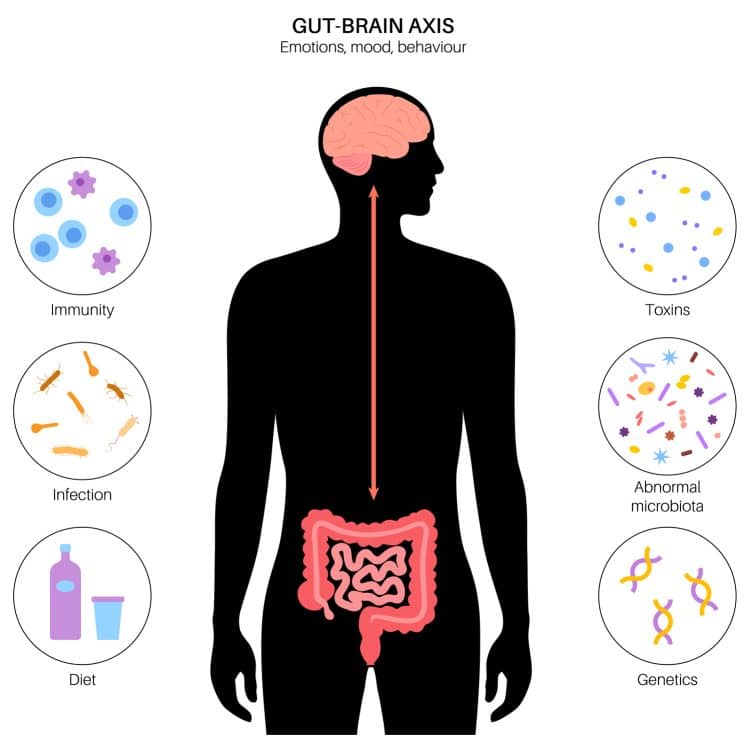Do you sometimes feel sluggish, tired, and unable to concentrate on daily tasks? The connection between your gut and brain could be the answer to a healthier and happier version of yourself. Over recent years, there has been considerable research in this regard, and it is seen that there is a significant link between mental well-being and the digestive system (the gut). Intermittent fasting has emerged as the most effective tool to enhance these systems.
Intermittent fasting, if done correctly, can do a lot for you. Besides being an effective weight management tool, it can improve your mood, elevate energy levels, and increase longevity. This article explores the connection between the gut and the brain with respect to intermittent fasting, so keep reading to find out some incredible facts.
What is Intermittent Fasting, and How Does it Work?


Intermittent fasting is a dietary approach where you oscillate between fasting and eating periods. Intermittent fasting has been a longstanding practice throughout history. Since the early 20th century, researchers have studied intermittent fasting for its weight loss effects, and it is only recently that this practice has been studied for its other health benefits.
You can practice intermittent fasting in multiple ways. For example, you may want to keep a fast for 16 hours a day and only eat in the remaining eight-hour window with 16/8 intermittent fasting. Again, you may also want to eat only one meal a day for two days a week in what is known as OMAD fasting (One Meal A Day). Some also follow 5/2 fasting, where they eat normally five days a week while restricting calorie intake to 500-600 calories on two non-consecutive days.
Here’s how intermittent fasting works. When you go for hours without food, your body will exhaust the glycogen stores that it uses to derive energy from and will instead switch to burning fat for energy. This process is known as “metabolic switching”. When metabolic switching occurs, your body will burn fat for energy because there are no glycogen stores to draw upon. This speeds up fat loss and is why so many people are drawn to intermittent fasting as an effective weight loss tool.
You would ideally see weight loss from the second week onward, and a healthy weight loss target to aim for is 1–2 pounds per week. Some experience weight loss as early as week two, while for others, it may take 4–6 weeks or even more. During intermittent fasting, you cannot consume any calories during the fasting hours, but you can have unsweetened coffee, tea, and lots of water to keep yourself satiated. IF is not that hard, and you should get used to the fasting schedule after a week or so.
The Gut-Brain Connection and Intermittent Fasting
Let’s take a close look at the gut-brain connection. There exists an intrinsic relationship between the gut and the brain. If we consider the microbiome of the gut, the food we eat plays a vital role in the production of neurotransmitters like dopamine and serotonin. They are essential for good health. You will be surprised to know that about 95% of the serotonin in our body is produced in the gut.


If the gut bacteria balance is unhealthy, neurotransmitter production and function will be adversely affected.
However, there is good news in the offing. You can fix your gut health and improve your mental health with intermittent fasting. Intermittent fasting can help tackle depression and anxiety. Intermittent fasting does this by bringing balance to the gut microbiota. [1][2][3]
When you do intermittent fasting, it gives your digestive system a break and provides your gut the time to restore itself through toxin removal. Fasting comes with several psychological and physiological benefits.
Opting for healthier food options and focusing on anti-inflammatory and nutrient-dense foods will impact brain health, mood, and attention. This is because of the connection between your gut and your brain. Whether you go for a Mediterranean diet or add smoothies to your day, your food choices will immediately impact your brain health. When you have a healthy gut microbiome, it will have a balancing effect on you and reduce symptoms associated with depression and anxiety.
Importance of Serotonin
Serotonin is a neurotransmitter associated with regulating many bodily and brain functions. Low serotonin levels (also known as serotonin deficiency) can cause mental health issues like OCD, anxiety, and depression.
If you are anxious, your brain is being driven by fear, making it hard to make decisions, take proper action, and communicate with others. In this condition, it is common to experience elevated stress levels, which have physical and mental ramifications.
Symptoms of Low Serotonin Levels
Low levels of serotonin are associated with a wide variety of symptoms. Here are some of the most pertinent ones:
- Disturbances in the sleep cycle, issues with sleep, insomnia
- Mood disorder and depression
- Seasonal Affective Disorder (SAD)
- Eating disorders
- Substance abuse
- Hyperactive behavior
- Worry, anxiety, and Generalised Anxiety Disorder (GAD)
- Obsessions, compulsive behavior, OCD (Obsessive Compulsive Disorder)
- Panic attacks
- Phobias
- Aggression, agitation, and irritability
- Cognitive impairment and poor memory
- Gastrointestinal issues, Irritable bowel syndrome, PMS, hormone dysfunction, weight problems, low blood pressure, fibromyalgia, fatigue, migraines, headaches, and chronic pain.
The Deep Connection Between Melatonin and Mental Health


So, we have now established that a healthy gut microbiome is necessary to produce serotonin, a neurotransmitter crucial for normal day-to-day functions. However, one more ace is up its sleeve; serotonin is the precursor to the hormone melatonin.
Melatonin is responsible for regulating our sleep-wake cycles. Our brains produce melatonin as a response to darkness in the dim-light melatonin onset process. If you have low serotonin levels, melatonin production will not be sufficient, and hence you will have less non-REM sleep at night, affecting your mental health and brain.
Hence, it is crucial to remember that when we have a healthier gut microbiome through intermittent fasting, we produce more serotonin, leading to more melatonin production and helping us enjoy quality sleep with healthier and better sleep cycles. With better sleep, our health improves.
Related: Melatonin Dosage Calculator
The Impact of Blood Sugar on Mental Health
When we practice intermittent fasting, the regular fasting periods lead to a lowering of insulin levels and blood sugar levels, helping us prevent health issues like type 2 diabetes and other conditions of metabolic nature that could affect our mental health.
Unregulated blood sugar levels and high insulin levels have been linked to mood and cognitive issues, and they can negatively impact memory, attention, and mood and increase stress levels.
If we can use intermittent fasting to balance our insulin and blood sugar levels, our mood, thinking, and cognitive abilities will improve. Even if the fasting window is as small as 12 hours, it can trigger a cellular process called autophagy, where the cells repair and clean themselves, optimizing health.
Intermittent Fasting and Brain Function During Aging
We have some evidence showing that IF can improve some aspects of brain function as we age, particularly the issue of Mild Cognitive Impairment (MCI). MCI is a pre-dementia stage, including problems with thinking. Notably, this is a reversible condition.
There was a study involving three groups of above-60 people who had mild cognitive impairment and also did intermittent fasting. [4]
A follow-up after three years showed that 25% of people in the fasting group now had no cognitive impairment, compared to 14% in the occasional fasting group and less than 4% in the non-fasting group.
Intermittent Fasting and Mental Health


Many studies have looked at the effect of intermittent fasting on mental health issues like anxiety, stress, and depression. A recent scientific review analyzed 11 such results, with more than 1,400 participants. [5]
Most of these studies hinged around Ramadan fasting from dawn to dusk, with some involving 5:2 fasting and one-day-a-week fasting, along with 14/10 time-restricted feeding. When these studies were analyzed collectively, no significant results were produced. But if the poorer quality research were to be omitted, the remaining studies exhibited that the participants showed lower depression and anxiety levels after they had gone through intermittent fasting.
While these results are promising, scientists today don’t know how fasting and mental health improvements are linked. They must also determine if the results happened because of how IF works or due to lower calorie consumption.
Intermittent Fasting and Memory
Studies on rodents have pointed out that intermittent fasting increases the rats’ abilities to generate new brain cells. This process is called hippocampal neurogenesis. This is an important process related to some specific aspects of memory.
A study was done on obese volunteers aged 35-75 who followed either intermittent fasting or a standard calorie-restricted diet for four weeks [6]. The results pointed to improvements in both groups for pattern separation. Pattern separation helps the brain distinguish between memories of a similar nature. But, when it came to recognition memory, people in the IF group exhibited a decreased ability.
This led the researchers to conclude that eating fewer calories could help improve memory types based on the theory of hippocampal neurogenesis. However, please note that evidence is lacking on whether this is due to the inherent mechanism of intermittent fasting.
What to Eat While Doing Intermittent Fasting to Improve Brain Health


Intermittent fasting involves going for long periods without food during the fasting window and consuming calories only during the feeding window. Hence, it is crucial to ensure that when you eat, you are following a healthy diet that can support your energy requirements during the fasting periods.
If you eat probiotic foods like yogurt, kefir, pickled vegetables, tempeh, kimchi, kombucha tea, sauerkraut, and miso, along with a healthy selection of plant-based foods, they will go on to feed the good bacteria in your gut and help you draw upon all the nutrients you need.
Including high-quality protein, fiber, and fats will also ensure you feel satiated for longer. Include the following foods in your diet;
- Vegetables
- Fruits
- Whole Grains
- Legumes, such as lentils and chickpeas
- Nuts and seeds, poultry and fish
These foods are often found in the Mediterranean diet, which could also improve your brain’s health.
A study involving people with an average age of 70 years following the Mediterranean diet found that the Mediterranean diet had a close association with a reduced risk of cognitive disorders. [7]
FAQs
Can intermittent fasting be good for the gut?
There is evidence to support that intermittent fasting can benefit your gut health and boost the gut microbiome. Hence, it is good for your gut.
Can I get gut problems by following intermittent fasting?
Some people who follow intermittent fasting could have gut issues like bloating, diarrhea, constipation, or nausea.
Does intermittent fasting have any effects on the brain?
Intermittent fasting can do wonders for the brain. It slows down the aging process and also increases neuroplasticity in the brain. This helps optimize the brain’s function and improves its defenses to protect against cognitive diseases.
Conclusion
Our gut-brain connection is a vital one, a complex and intricate network playing an important role in maintaining overall health and mental well-being. Intermittent fasting nourishes this connection by improving the gut microbiome, reducing inflammation, and also promoting neuroplasticity in our brains.
The evidence gathered from research on this subject shows that intermittent fasting is a very effective tool for scaling up the gut-brain connection, thereby improving our physical and mental health. It is important to get the go-ahead from a doctor before you start intermittent fasting, and for those who practice this fasting method, the benefits are significant.
References
- Berthelot, Elisa, et al. “Fasting Interventions for Stress, Anxiety and Depressive Symptoms: A Systematic Review and Meta-Analysis.” PubMed Central (PMC), 5 Nov. 2021.
- Effect of Gut Microbiota on Depressive-like Behaviors in Mice Is Mediated by the Endocannabinoid System – PubMed.” PubMed, 11 Dec. 2020.
- “Intermittent Fasting Supports the Balance of the Gut Microbiota Composition – PubMed.” PubMed, 1 Jan. 2023.
- Ooi, Theng Choon, et al. “Intermittent Fasting Enhanced the Cognitive Function in Older Adults With Mild Cognitive Impairment by Inducing Biochemical and Metabolic Changes: A 3-Year Progressive Study.” PubMed Central (PMC), 30 Aug. 2020.
- Berthelot, Elisa, et al. “Fasting Interventions for Stress, Anxiety, and Depressive Symptoms: A Systematic Review and Meta-Analysis.” MDPI, 5 Nov. 2021.
- Kim, Curie, et al. “Energy Restriction Enhances Adult Hippocampal Neurogenesis-Associated Memory After Four Weeks in an Adult Human Population With Central Obesity; a Randomized Controlled Trial.” PubMed Central (PMC), 28 Feb. 2020.
- Van den Brink, Annelien C., et al. “The Mediterranean, Dietary Approaches to Stop Hypertension (DASH), and Mediterranean-DASH Intervention for Neurodegenerative Delay (MIND) Diets Are Associated With Less Cognitive Decline and a Lower Risk of Alzheimer’s Disease—A Review.” PubMed Central (PMC), 18 June 2019.
